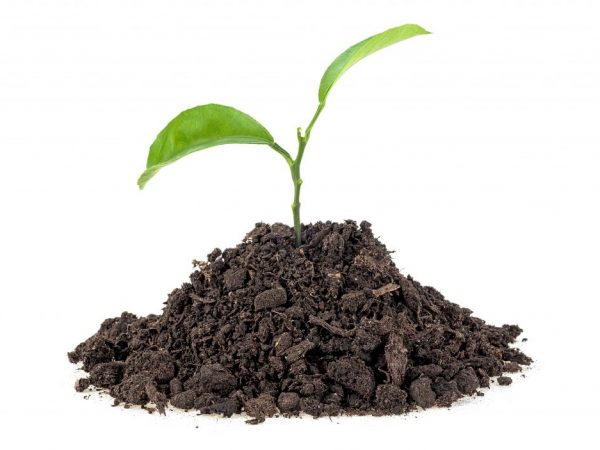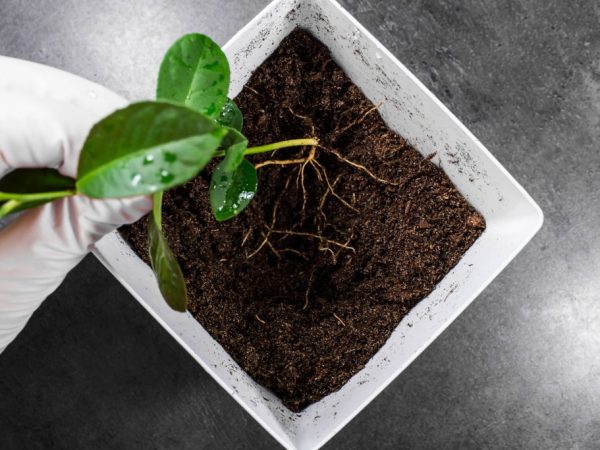Land for homemade lemon
Lemon soil plays an important role in the growth and development of the plant. Choosing the right soil for homemade lemon helps to grow the tree and get quality fruits.

Land for homemade lemon
Lemon soil
For indoor lemon seedlings, the soil should be light and rich in minerals. The mixture is purchased in the store or prepared on your own. Cultivation of lemons begins at 2-3 years of age, provided that the optimal development conditions are observed.
The normal growth of the plant is ensured by introducing a high-quality soil mixture. It must meet the following parameters:
- lightness, air and moisture permeability;
- neutral pH5-7: increased acidity of the soil affects leaf fall and plant death;
- lack of earth lumps that interfere with the penetration of nutrients to the roots.
Growing young lemon trees is impossible in heavy soil, moisture is poorly distributed in it and greenhouse processes are present. The root system is prone to drying out and rot.
Soil composition
Indoor lemon trees need to be matched to their age. For a young lemon tree, a soil composition containing sand and peat is selected, an adult plant loves heavy soils. The soil for the lemon should be enriched with fertilizers.
Store-bought lemon mixes
Store-bought lemon primer consists of:
- fibrous peat: remnants of marsh plants after decay, material with water and air permeability, containing components necessary for growth and development;
- peat humus after decomposition;
- sand;
- a complex of fertilizers consisting of nitrogen, phosphorus and potassium.
Homemade lemon does not always take root after transplanting it into store soil. This is influenced by the following factors:
- the use of waste land from greenhouses for the preparation of mixtures: it is devoid of nutritional components, pathogenic microflora is developed in it;
- storage of soils: in tight bags in a humid environment, plant components decompose, conditions are created for the development of anaerobic bacteria.
Soil selection
When choosing a store-bought soil for homemade lemon, check:
- start and end date of the expiration date;
- proportions of minerals: lemon needs nitrogen, phosphorus and potassium;
- the size of the constituent parts of the soil: the presence of large compressed lumps indicates poor quality of the mixture.
Preparing the soil at home

It is better to prepare the soil yourself
Homemade soil is better for lemon than store-bought mixture.
For cooking you will need:
- low-lying peat (before use, it is ventilated for 2-3 days);
- garden land;
- sod land (good properties near the land from a clover meadow or a plot with nettles);
- humus from leaves (it is better to collect soil from under lindens; soil from under willows, oaks and needles will not work, since it has a high acidity and tannins content);
- sand;
- dung humus;
- alder or birch charcoal;
- crushed coal - 20 g.
A mixture of all components is prepared in advance, all elements are mixed. Garden, turf, deciduous soil and sand are used in a ratio of 1: 1: 1: 1.
You can plant young indoor lemons in a mixture of turf and deciduous humus in a 1: 1 ratio, a small amount of sand or peat. Soil storage is carried out in a cool place.
Land quality
After preparation, before planting, check the quality of the resulting land for lemons. The pH level is checked using litmus paper. A lump of earth is moistened with filtered or distilled water, litmus paper is tightly applied to it. The yellow, green color of the paper indicates a pH level of 6-7, red - about high acidity, blue - about an alkaline environment.
To check for the presence of oil impurities in the mixture, a small part of it is sent to water and mixed.
After subsidence of the earth at the bottom, examine the surface of the water. If there are no greasy spots on the surface, there are no impurities. The study of the mineral composition allows you to choose the soil you need for lemons.
Drainage preparation
It is important for the indoor lemon plant to create a drainage layer in the pot so that excess moisture can freely escape into the planter or tray. Drainage is prepared using expanded clay, crushed stone, pebbles, broken brick, fragments of clay dishes. Lemon is suitable for drainage from sand, peat, remaining after preparing the soil.
Conclusion
The choice of land provides the indoor lemon with full growth and development. The correct composition of the soil is important in the care and cultivation process: thanks to the nutrients and minerals, the tree will begin to grow and bear fruit well.


